- Home
- Lloyd Alexander
The Gawgon and the Boy Page 11
The Gawgon and the Boy Read online
Page 11
My grandmother occasionally received penny postcards from Uncle Will. He was living in a boardinghouse in Detroit and, miraculously, had found part-time work in a factory.
"He sounds happy. He deserves to be." My grandmother studied his latest message. "It seems he has a lady friend."
"He writes that on a postcard?" exclaimed Aunt Rosie, who was there when the news arrived. "Where the mailman and anybody else can read it?"
"I'm sure the mailman isn't interested," my grandmother said. Aunt Rosie snorted. "I'm sure he is."
Going down the hall one evening, I saw my sister's door was open and the light on. She was sitting on the edge of her bed. Neck bent, shoulders drooping, she looked so forlorn and miserable I thought she might have broken a fingernail. I stood a few moments in the doorway. When she noticed me, she did not yell at me to go away. This was extraordinary. I ventured in and asked what was wrong.
"I'm not going to Rittenhouse Academy anymore," she said. That, I said, was wonderful news. I congratulated her on being so lucky. "You stupid blighter," she said, "I'm not going back and neither are you. Never."
That was a happy relief. I had feared, without someone to give me lessons, I might be returned to the clutches of Dr. Legg. I had planned, if such a disaster threatened, on trumping up some new and horrible sickness.
"Didn't they tell you?" she said. Generally speaking, no one told me anything right away. If it was important, they would get around to it sooner or later.
"Father's closing the store," she said. "He's selling our house. Grandmother's, too."
At first, I wondered if she was just making it up to torment me, but she looked so awful she had to be sincere. Still, it made no sense. Where would we live?
"We're moving," she said. "Grandmother and Aunt Florry, too. Father bought a new house. Don't you understand?" she flung at me. "We have to go away. All of us. To some stupid place."
I was so dumbstruck I sat down beside her. She had, thus far, been speaking bitterly and resentfully. Now she started crying. So did I. We actually put our arms around each other.
19 The Irish Shillelly
My sister's information about unpleasant things was, as always, right. By the time my parents got around to telling me, it came as no surprise. Late that spring, with my grandmother, Aunt Florry, and Nora, we moved to a place called Rosetree Hill, a dozen or so miles from Philadelphia. We called it the new house, but it was a very old one. It stood at the far end of Lakeview Avenue. Though I saw no lake to view, I learned there had been one, filled in when the neighborhood was built up. There were reminders of its presence when it seeped through the cellar floor, setting the basement awash at regular intervals. "It looks like the Ming Dynasty," said my father, standing in the middle of the living room after everything was installed. He had closed his store and sold the contents, salvaging as much as he could in the way of lamps, screens, wall hangings, and some lacquered tables. The effect was definitely Oriental. The Mexican jumping beans had been lost in the shuffle.
I never understood my father's business dealings. I could only guess he had sold or rented out the houses on Lorimer Street and Larchmont Street, calculating we could live on that money until he went into a new business.
He had bought the house as soon as he saw it. Dirt cheap, he said. Understandably, for it was falling apart. The faucets dripped with continuous tinkling, like wind chimes. The floors sagged, the plumbing moaned and gargled when anyone flushed the toilet. The stairs sloped at an acute angle, strenuous to climb up, perilous to climb down.
"It's a fine house," my father said. "You won't find another like it."
"I'm sure not," my mother said. "Now, that's what I call a property." My father held out his arms in an all-embracing gesture. "Land."
What he meant was the house had a front lawn. It was covered with bald spots as if the grass had a skin disease. Instead of an alley and are away, there was an equally afflicted yard in the back, where sturdy clumps of weeds flourished. A porch and wooden railing ran along the front of the house. Chains dangled from the porch ceiling where once had been a swing. They looked like equipment from a medieval torture chamber.
It was the last house on Lakeview Avenue. Farther down were vacant lots. Still farther, at the dead end, some woods began: spindly trees and thickets. Our neighbors' neatly trimmed lawns seemed to pull their skirts away from us, leaving our property to itself in a sort of real-estate Hell. My father was proud of the new house. I hated it.
If my grandmother's boardinghouse expanded and contracted like an accordion, our new house was more like a rabbit warren, with closets, cubbyholes, a pantry with lopsided shelves. Nora, with her cage and pole, held pride of place in the Ming Dynasty living room. We had not enough bedrooms to go 'round, so I was assigned to the attic-partly finished, it was called, which meant that one side was bandaged with wallpaper; the other, a skeleton of rafters. I was warned never to walk on the area in front of the eaves or I would crash through to the floor below.
I tossed and turned most of our first night in the new house. My old familiar bed felt as if we had never met. I had no idea what time it was when I woke again. The Gawgon was sitting on my unpacked boxes.
I was surprised but happy to see her. "We moved," I said. "How did you find the house?"
"I can always find you," The Gawgon said. I blurted out that I hated the place. "Understandable," she said. "Nobody likes being uprooted."
"You'll get used to it." I said I doubted that. "Where's your imagination, Boy?" she answered. "You can turn this house into anything you please. King Arthur's castle, if you like. Or Dracula's, with bats and a vampire's coffin in the cellar or a Parisian garret," she went on, "with starving artists running in and out. A beautiful model having her picture painted-you're old enough to be interested in that sort of thing."
I began cheering up. Before The Gawgon could continue, I heard doors banging open and my father yelling. I jumped out of bed and stumbled down the attic steps.
Everybody was awake. My father, in striped pajamas, was heading for the landing, my mother behind him, telling him to put on his bedroom slippers.
"Nobody move! Stand where you are!" my father commanded. "I've got a gun!" Sleep-fuddled and confused, I called out the first thing that came to mind: "Don't shoot The Gawgon!"
"Oh, Alan, you don't have a gun," my mother said. "If anybody's there, why tell them to stay?"
My father paid no attention. He was waving his arms and hurrying down the stairs while my mother tried to hold him back. He managed the first couple of steps, but lost his footing and went skidding down the rest. It brought him to the living room faster than if he had walked.
All the lights were on by now. We clattered after him. Unruffled by his rapid descent, he inspected the living room. He was sure, he said, he heard prowlers. He found none and stepped through the dining room into the kitchen.
The cupboard was open, so was the icebox. The latch on the pantry door had been broken. A cracked egg lay on the linoleum floor.
"Burglars," my father said. "I told you so." My grandmother and Aunt Florry came to look around the kitchen while my sister observed from a distance. My mother surveyed the shelves and icebox. Missing, along with our eggs, were bottles of milk, some pork chops, a box of cornflakes, sugar, coffee, and a bag of flour.
"They only took the food. They didn't touch anything else," my mother said. "God help them, that's all they wanted." She sat down at the table and began to cry. Aunt Florry and my grandmother tidied up. My father toured the backyard to see if the burglars were hiding amid the weeds. I went back to the attic. The Gawgon was not there.
"What we really need," my father announced, "is a tree."
"Oh, Alan," my mother said, "whatever for?"
"Landscaping." My father stood on the front porch and surveyed the property. He narrowed his eyes as if scanning a vast expanse. "We need one."-he pointed at a bare spot in the middle of the lawn "right there."
When my mother asked where
he expected to get a tree, he motioned beyond the vacant lot at the end of Lakeview Avenue. "In the woods."
"Steal one?" my mother said.
"Who'll notice?" Without further discussion, he formed us into a raiding party. He walked ahead, as pioneer and pathfinder; I followed, carrying a spade salvaged from a heap of rusty tools abandoned in the cellar. My mother, holding a burlap sack, brought up the rear.
In the woods-I had begun thinking of it as Sherwood Forest-the only trees he liked were too big to dig up. He had to settle for a tormented-looking sapling with skinny branches and barely any leaves. None of us knew what kind; my father said it didn't matter. We wrapped the straggly roots in the sack. He carried it like a baby in his arms. At the house, he called out for my grandmother, Aunt Florry, and my sister. We took turns excavating a hole. Then he went inside and came back with a pair of scissors.
"For good luck." He ceremoniously snipped locks of hair from everyone's head, including his own. He laid them, with one of Nora's feathers, in the bottom of the hole.
"We can plant it now," he said. "It's our family tree."
Later in the afternoon, Aunt Rosie and Uncle Rob drove out to see how we were getting on. Aunt Rosie stared at the addition to the yard:
"What, for heaven's sake, do you call that?"
"I call it a tree," my father retorted.
"What's that crookedly stick the Irish carry to hit each other?" Aunt Rosie asked Uncle Rob.
"A shillelagh," he said. "That's it," Aunt Rosie said. "It looks like an Irish shillelly."
We all went to the porch, where my father had us stand to get a better perspective on the sapling. If we squinted a little, he said, we could see traces of green.
A dog, just then, came wandering past the house and sighted our family tree. Wagging his tail, an eager grin on his face, he trotted up and peed on it.
Each day after that, dogs of every size and ancestry showed up. Some I did not recognize as belonging in the neighborhood; they must have traveled from miles away, all members of a widespread network, a peeing society with its meeting place at the Irish shillelly-its permanent name, thanks to Aunt Rosie. We chased them off whenever we saw them.
My father did not worry about the dogs. The Irish shillelly showed signs of actually growing a little. As my father saw it, we were getting free fertilizer.
20 A Swimming Party
I nearly drowned, that summer, and also fell in love. The drowning part came first, but both events happened at practically the same time. I very sensibly did not mention either one to my family. In any case, they were all occupied with other things. Now that we had settled into the new house, my father concentrated on making a living. He thought about it a lot, mainly while sitting on the porch, eyes closed in meditation, sometimes glancing up to admire the Irish shillelly. He still read the financial pages of the newspaper, more out of habit than anything else, for there were no finances to read about. "All in due course, all in due course," he assured my mother when she asked what he had in mind. "I'm planning my strategy."
Aunt Florry, it turned out, was the first to get a real job. Her old employer, Mrs. Heberton, had been as good as her word. She did ask around on Aunt Florry's behalf. Through her influence, Aunt Florry was hired as a clerk in the mortgage department of the biggest bank in Philadelphia. Always a nifty dresser, she looked especially nifty when, each morning, she walked the quarter mile to the trolley. Not only an old and most distinguished institution, the bank also provided free lunches to its employees. When she came home in the evening, Aunt Florry often brought some buttered rolls, a slice of pie, or other portable tidbits saved out of her meal and wrapped in paper napkins.
My grandmother had news from Uncle Will. Instead of a postcard, this time he wrote a letter, saying he was getting married.
"I'm glad," my grandmother said. "I only hope she treats him better than," she rolled her eyes "you know who;" I did not, but everyone else did. All agreed it was a good thing for Uncle Will, so I was happy for him. My sister was too busy to pay much attention to any of that. She cultivated another Tulip Garden.
Our first week or two in Rosetree Hill, she had been sullen and brooding. Then, almost overnight, a Tulip Garden sprang up. I never learned whether she grew a new one or got transplanted into one already flowering; nor did I understand how she managed it so quickly. But all at once, there they were, looking the same as the previous group though noticeably blossomed out.
On hot afternoons, they clustered, long-legged in their summer frocks, in languid attitudes on the porch steps. Most of the time, along with the standard whispering and giggling, they gossiped about the young men of Rosetree Hill; in particular, someone called Nick Ormond. The very name carried enough magical power to send them swooning in rapture. Nick Ormond, I gathered, was the local hero. Like my sister and her companion tulips, he was going to be a senior at Rosetree High School that coming fall. A foregone conclusion, beyond any doubt, he would be captain of the football team, head of the student council, class president, and, later, king of the world.
As with the previous Tulip Garden, their company was forbidden to me. "Make him keep away," my sister warned them. "He'll try to look down your dress." This was true, but I thought nobody noticed. And so I could only ogle and eavesdrop from a distance.
My father, meanwhile, had struck on a plan to make a fortune. "The River Jordan," he said. "I'm going to buy it."
"Oh, Alan, that's ridiculous," my mother said. "I'm sure it's not for sale."
"Not the whole river," my father said. "Just some." His plan involved importing Jordan water by the barrel. He would then repackage it in small bottles, like perfume, and sell them-along with a fancy certificate-for baptisms. The Jordan water would get babies to a good start in life.
He proposed using regular tap water and adding a few drops from the Jordan. "A little," he said, "should go a long way."
My mother wanted no part of the scheme. Diluting water with water, even Jordan water, seemed dishonest. And who knew what kind of trouble he could get himself into, especially with God Almighty?
My father said he would take his chances, we needed the money. Since he was unsure who actually owned the river and how he might buy some from a spot nobody cared about, he wrote letters to kings, prime ministers, and various ambassadors. Awaiting their answers, he went back to studying the financial pages.
For myself, idle, I scuffed around the house and halfheartedly chased dogs away from the shillelly, which persisted in putting out a couple of leaves from time to time. Most often, I holed up in the attic with The Gawgon's books.
The Gawgon still came to visit, although irregularly. Once, poking at the clutter on my table, she gave me a quizzical look: "What, Boy, you've stopped drawing pictures?"
I nodded. I had, indeed, given that up; nor had I bothered to think of any foolish stories. I told her I hadn't felt like it. "As good a reason as any," The Gawgon said. "You'll start again, sooner or later."
"No," I said. Things weren't the same. "Nothing stays the same," The Gawgon said. "Not you, not anything else. Don't worry, you'll find what you need."
"I don't care," I said. The Gawgon left. I was sorry. It was the first time I had been any way snappish to her.
Occasionally, for the sake of getting away from the house, I wandered the neighborhood, hoping to find boys my own age. The only ones in the vicinity were several years older than I. They were cordial enough; they simply had their own interests.
I ventured, one day, past the end of the street, beyond Sherwood Forest, where it turned into serious woods, chick with trees and heavy underbrush, outcroppings of rocks, gullies that fell away so suddenly I nearly tumbled into them. I pressed on and soon came to a creek bubbling over a stony bed.
I followed it a while. Farther along, I heard whoops and yells. The creek had widened into a modest river with sloping, pebbly banks. Half a dozen older boys were swimming, splashing, and ducking each other with a lot of merriment and horseplay.
I picked my way closer to stand and watch. They noticed me but neither chased me away nor invited me to join them. One, sandy-haired, with a pair of athletic legs and black swim trunks was clearly the leader. When he jumped into the water, so did everyone else: when he sunned himself on the shore they all squatted around him.
Had my sister been there she would have gone berserk for one of his encourage addressed him as "Nick." It dawned on me I was in the very presence of that paragon of animals and future king of the world: "Nick Ormond himself."
I hung around the fringe of chis activity for a time. When they tired of swimming, they all traipsed off together and left the creek to me. It looked so inviting, with the sunlight flashing on the green ripples. I thought how pleasant it would be to go for a swim. I glanced around. making sure I was unobsen-ed. then peeled down to my underwear.
The water, when I stepped into it, was chillier than I expected: gooseflesh erupted all over me. I got used to it after a minute or so. and launched myself into the current. There were only two difficulties First. I had never been in water chis deep: second. I did not know how to swim.
These had not seemed insurmountable problems. I had watched Nick and his friends. It looked simple and easy enough. I followed their example. And sank like a scone. By the time I realized I should have kept my mouth shut. I believed I had swallowed half the creek while the ocher half poured up my nose and into my ears. I thrashed around which only made matters worse. I assumed I was drowning. and char could get me in serious trouble at home. In the course of kicking and flailing and yelling when I found enough breath to do it, my feet scraped the bottom. It occurred to me, in some dim instinct for survival, to stand up. When I did, the water came barely to my shoulders. All I had to do was walk out. Gasping and coughing, I lumbered against the current, which felt like crawling through molasses. Torn between gratitude for my salvation and fury at my idiocy, I sprawled on the bank.

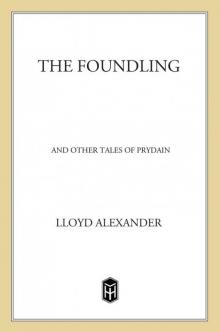 The Foundling and Other Tales of Prydain
The Foundling and Other Tales of Prydain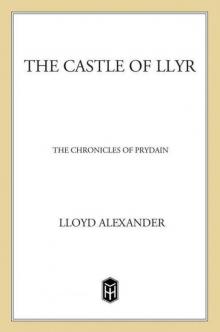 The Castle of Llyr
The Castle of Llyr Taran Wanderer (The Chronicles of Prydain)
Taran Wanderer (The Chronicles of Prydain) Taran Wanderer
Taran Wanderer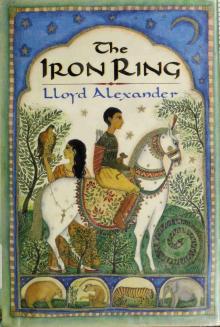 The Iron Ring
The Iron Ring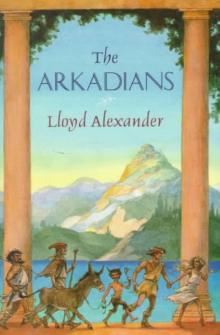 The Arkadians
The Arkadians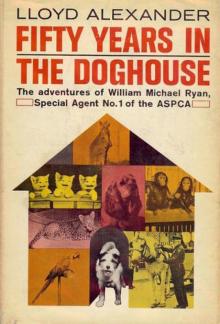 Fifty Years in the Doghouse
Fifty Years in the Doghouse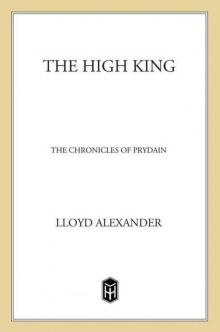 The High King
The High King The Remarkable Journey of Prince Jen
The Remarkable Journey of Prince Jen The Book of Three
The Book of Three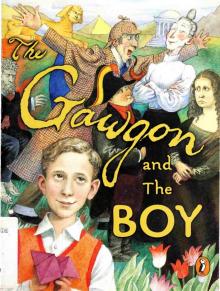 The Gawgon and the Boy
The Gawgon and the Boy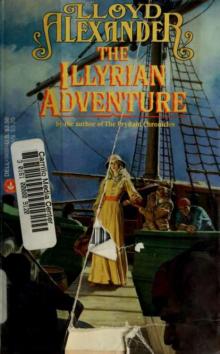 The Illyrian Adventure
The Illyrian Adventure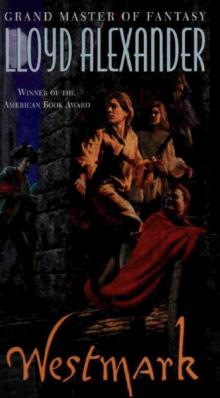 Westmark
Westmark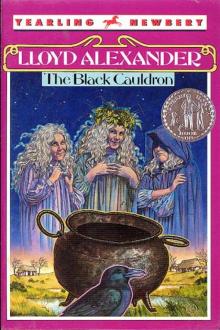 The Black Cauldron
The Black Cauldron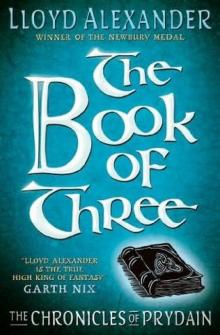 The Book of Three cop-1
The Book of Three cop-1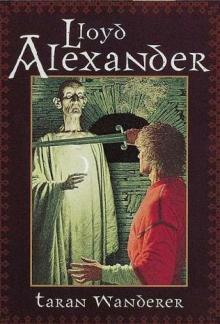 Taran Wanderer cop-4
Taran Wanderer cop-4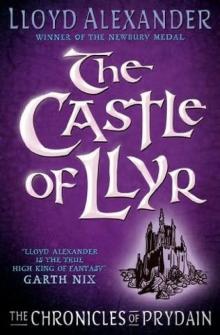 The Castle of Llyr cop-3
The Castle of Llyr cop-3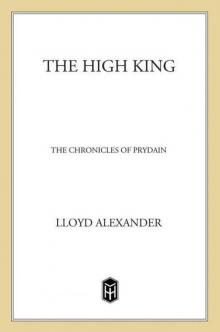 The High King (Chronicles of Prydain (Henry Holt and Company))
The High King (Chronicles of Prydain (Henry Holt and Company))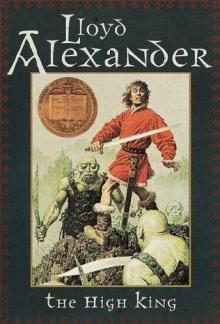 The High King cop-5
The High King cop-5 The Foundling
The Foundling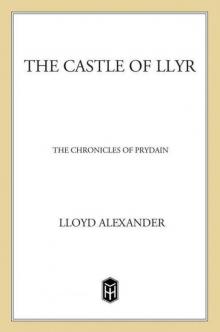 The Castle of Llyr (The Chronicles of Prydain)
The Castle of Llyr (The Chronicles of Prydain)